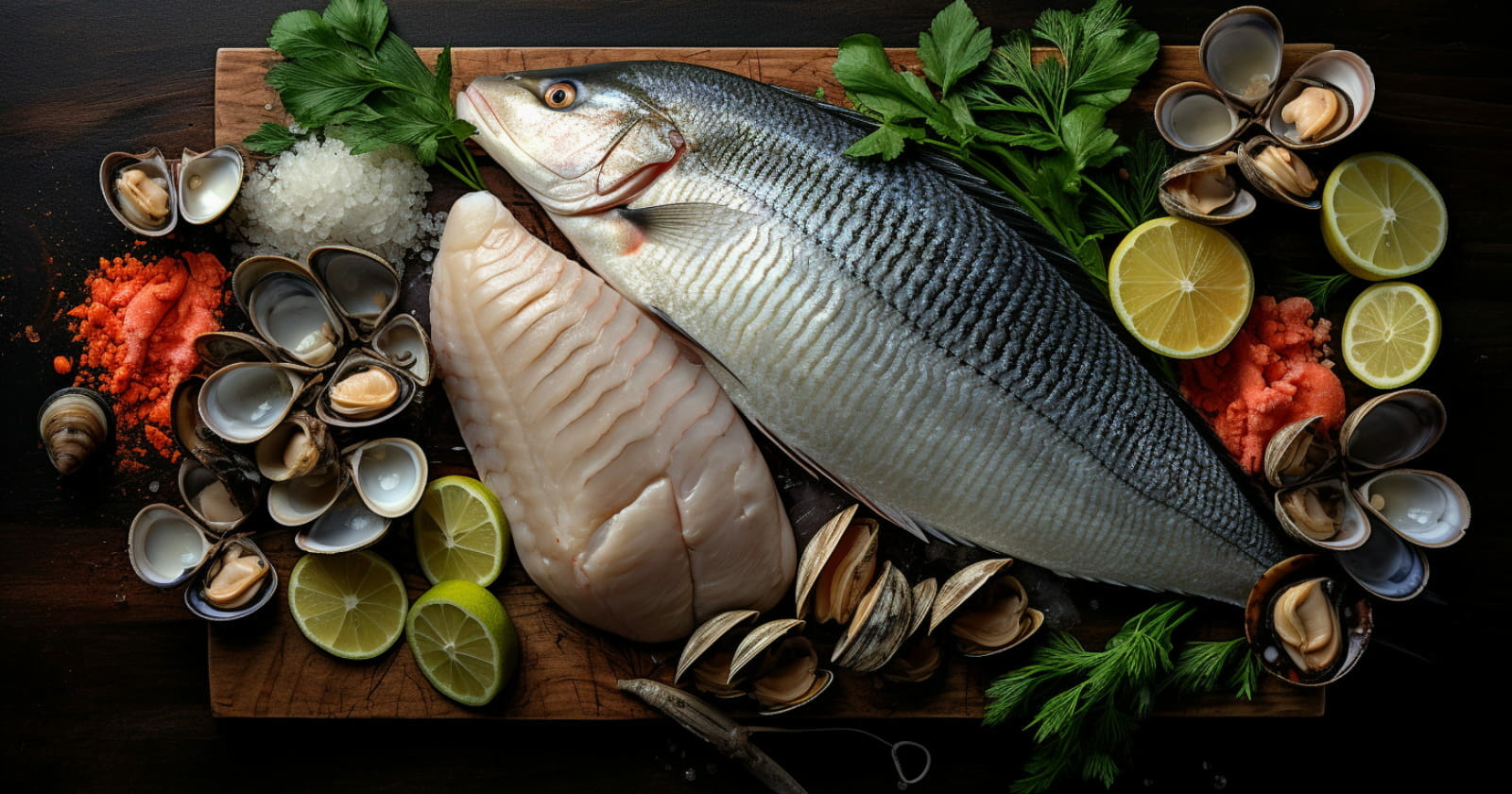Taurine is naturally present in foods like seafood, red meat, and dark poultry, is a lesser-known amino acid with various promising health benefits.

Key takeaways:
- Seaweed, particularly nori, emerges as the top taurine source, with over 1,000 mg per 100 grams.
- Tilapia is a protein-rich taurine source, offering nearly 1,000 mg per serving.
- Scallops supply around 850 mg of taurine per 100-gram serving, while mussels and clams offer 780 mg and nearly 700 mg per 100 grams, respectively.
- Dark turkey and chicken meat provide taurine, offering around 437 mg and 265 mg per 100 grams, respectively.
- Beef offers a relatively moderate taurine source with roughly 68 mg per 100 grams.
While taurine might not be as famous as other nutrients, its significance in our diet cannot be overlooked. This little-known amino acid is naturally present in various foods, particularly in animal-based sources.
Beyond being an ingredient in energy drinks, taurine plays a vital role in the human body, with emerging research suggesting it could have implications for longevity and overall well-being.
Table of Contents
What Foods Are High in Taurine?
Taurine is naturally found in various animal-based foods and is less common in plant-based options.
Here are 15 food sources of taurine:
- Seaweed, like nori, is densely packed with taurine, supplying over 1,000 milligrams (mg) per 100 grams. Beyond being a stellar taurine provider, edible seaweeds offer an abundance of iron, calcium, and vitamin C.
- Tilapia is an excellent source of taurine, with nearly 1,000 mg in a serving. This protein-rich fish is relatively low in fat. It is a hearty and affordable fish. Broil or bake it simply, then squeeze lemon for a light, nutritious dinner.
- Scallops supply around 850 mg of taurine in each 100-gram serving. They also furnish zinc, B12, and protein that boost immunity, metabolism, and muscle recovery after exercise.
- Mussels offer comparable amounts of taurine to clams, with about 780 mg per 100 grams. Their amino acid, vitamin, and mineral content make mussels a true superfood from the sea that benefits muscles and mind alike.
- Clams deliver a motherlode of taurine at nearly 700 mg per 100 grams. Their abundance of iron, vitamin B12, and protein make clams a uniquely nutrient-dense choice.
- Raw Squid is a top source with about 520 mg of taurine per 100 grams. This low-calorie, low-fat mollusk also provides protein, Vitamin B12, selenium, iron, and potassium.
- Dark turkey meat leads the way in the poultry department, supplying nearly 437 mg per 100 grams. Turkey also adds protein, selenium, and B vitamins to satisfy hunger, protect immunity, and power us through busy days.
- Octopus provides about 335 mg of taurine per 3-ounce serving. Octopus fills you up with lean protein and iron but leaves out the fat, making it ideal for heart health.
- Dark chicken meat offers approximately 265 mg of taurine per 100 grams, giving it a leg up over light meat. Beyond taurine, chicken supplies satiating protein and nutrients to power activity and recovery.
- Though small, shrimp delivers up to 225 mg of taurine per 100 grams. Their abundance of antioxidant selenium teams up with taurine to promote immune health and vitality.
- Cod fish offers a comparable nearly 176 mg of taurine per 100-gram serving, alongside lean protein. This firm white fish is an excellent choice for trying out flavor combinations.
- Salmon brings a valuable infusion of anti-inflammatory omega-3s alongside its taurine content. A 100-gram serving nets over 130 mg of taurine to accompany salmon’s renowned cardiovascular and neurological wellness benefits.
- Roasted Pork while not the most significant taurine source, still provides about 84 mg per serving. Pork supports energy and muscle performance as a lean protein source with thiamin and B vitamins.
- Beef is rich in protein and micronutrients like iron, zinc, and taurine. A 100-gram portion nets approximately 68 mg of taurine to complement beef’s muscle growth and energy benefits.
- Dairy products like milk and yogurt contribute small but valuable amounts of taurine in addition to their calcium, probiotics, and protein content. Whole cow’s milk provides about 3.4 mg of taurine per 100-gram serving, while yogurt from cow’s milk contains around 0.9 mg of taurine.
A balanced diet with a variety of these and other whole foods can help optimize taurine intake and overall nutritional status.
It’s worth noting that some energy drinks and supplements contain synthetic taurine. While the body can produce taurine from other amino acids, dietary sources may still be necessary to maintain optimal taurine levels in certain health conditions.
To put it into perspective:
- A typical American diet can provide around 123 to 178 mg of taurine daily.
- A lacto-ovo vegetarian diet, which includes dairy and eggs but excludes meat, might offer around 17 mg of taurine per day.
Why Do We Need Taurine?
Taurine is an amino acid that plays many critical roles in the body. Unlike some other amino acids, taurine is considered “conditionally essential” — meaning that while the body can produce some on its own, we still need to obtain more from dietary sources during certain situations like illness or stress.
Taurine acts as an antioxidant, protecting cells from damage, and aids the transport of nutrients across cell membranes. Research suggests taurine may benefit heart health, blood sugar control, athletic performance, and neurological conditions.
However, more clinical studies are needed. Given taurine’s wide-ranging functions, consuming sufficient amounts from foods can help maintain overall health and well-being.
Are Taurine Supplements Safe?
Taurine supplements are generally considered safe when used appropriately and under medical supervision. The body naturally produces taurine; getting additional amounts from foods or supplements is usually well tolerated.
However, very high doses from supplements may cause side effects like back pain, vomiting, and digestive issues in some people.
Certain groups, like pregnant individuals, should avoid supplemental taurine due to a lack of safety research. Also, those taking medications should consult a healthcare provider, as interactions with taurine are possible.
For healthy adults, doses up to 3,000 mg daily from supplements are thought to be safe according to experts, although optimal dosing requires more study. Moderately supplementing with reputable brands after discussing with your healthcare provider can help ensure taurine intake suffices if dietary sources are inadequate.
What About Taurine in Energy Drinks?
Taurine is commonly added to popular energy drinks. Consuming an 8-ounce energy drink can significantly boost daily taurine intake, potentially increasing it by 6 to 16 times. This may mean adding an extra 44 to 117 mg of taurine to your diet.
The taurine in energy drinks is synthetically produced and functions as a supplement. While human studies are limited, the large doses of taurine provided by energy drinks may have effects like improved mental focus, reduced fatigue, and enhanced exercise capacity in the short term.
Although taurine, by itself, in energy drinks is usually not a concern, the potential issues lie in the additional ingredients, such as caffeine, sugar, and herbal extracts found in those drinks. The safety of these beverages remains uncertain because of this blend of components.
Most healthy adults can consume energy drinks containing taurine without problems. However, some people might encounter side effects like dehydration, sleep disturbances, nervousness, and tension, mainly attributed to the caffeine content.
FAQs:
What meat is high in taurine?
Dark turkey meat stands out as a taurine powerhouse, offering nearly 437 mg per 100 grams. Not far behind is dark chicken meat, providing about 265 mg of taurine, followed by roasted pork, which contributes about 84 mg of taurine per 100 grams.
How do vegans get taurine?
Vegans can obtain taurine through various plant-based sources, although it’s generally less abundant in plant foods than animal products. Some taurine-rich vegan options include seaweed, particularly nori. Additionally, supplements are available for those who may have difficulty meeting their taurine needs through diet alone.
Does taurine slow down the aging process?
Research suggests that taurine may have a role in healthy aging. It appears to reduce cellular aging, protect against telomere shortening, improve mitochondrial function, reduce DNA damage, and lessen age-related inflammation. While these findings are promising, more research is needed to fully understand the extent of taurine’s impact on the aging process in humans.
What are the benefits of taurine?
Taurine may support heart health and potentially assist in controlling blood sugar levels. It may protect nerve cells, improve exercise performance, and may play a role in neurological development. But, further research is needed to validate these potential benefits on human health.
What are the side effects of taurine?
Taurine is usually safe when consumed within recommended limits. However, overconsumption of taurine can result in side effects, including back pain, vomiting, fever, headache, stomach pain, diarrhea, and fatigue.
Final Thoughts
If needed, boosting your taurine intake naturally can be easy with various options. Seafood lovers can enjoy scallops, mussels, clams, and fish like tilapia, tuna, and cod. Poultry enthusiasts can turn to turkey and chicken, especially the dark meat.
Beef and pork contain a relatively moderate amount of taurine, and dairy products like milk and yogurt offer smaller amounts. While some energy drinks contain synthetic taurine, it’s essential to consider their other ingredients.
A balanced diet with taurine-rich foods can help you maintain good taurine levels and overall nutritional well-being. Remember to consult a healthcare provider before making significant dietary changes or taking supplements.

Maggie Aime, MSN, RN
Maggie Aime, MSN, RN is a freelance health, wellness, and medical personal finance writer. Her extensive nursing experience includes oncology, kidney transplant, cardiology, and home health. Read more about her work at www.thewritern.com.
References
- Boccanegra et al. 2020. Safety issues and harmful pharmacological interactions of nutritional supplements in Duchenne muscular dystrophy: Considerations for Standard of Care and emerging virus outbreaks.
Caine et al. 2016. Taurine, energy drinks, and neuroendocrine effects. - McGaunn et al. 2023. Taurine linked with healthy aging.
- Shao et al. 2008. Risk assessment for the amino acids taurine, L-glutamine and L-arginine.
- WebMD. 2023. Top Foods High in Taurine.
- Zeratsky. 2023. Taurine is an ingredient in energy drinks. Is taurine safe?
